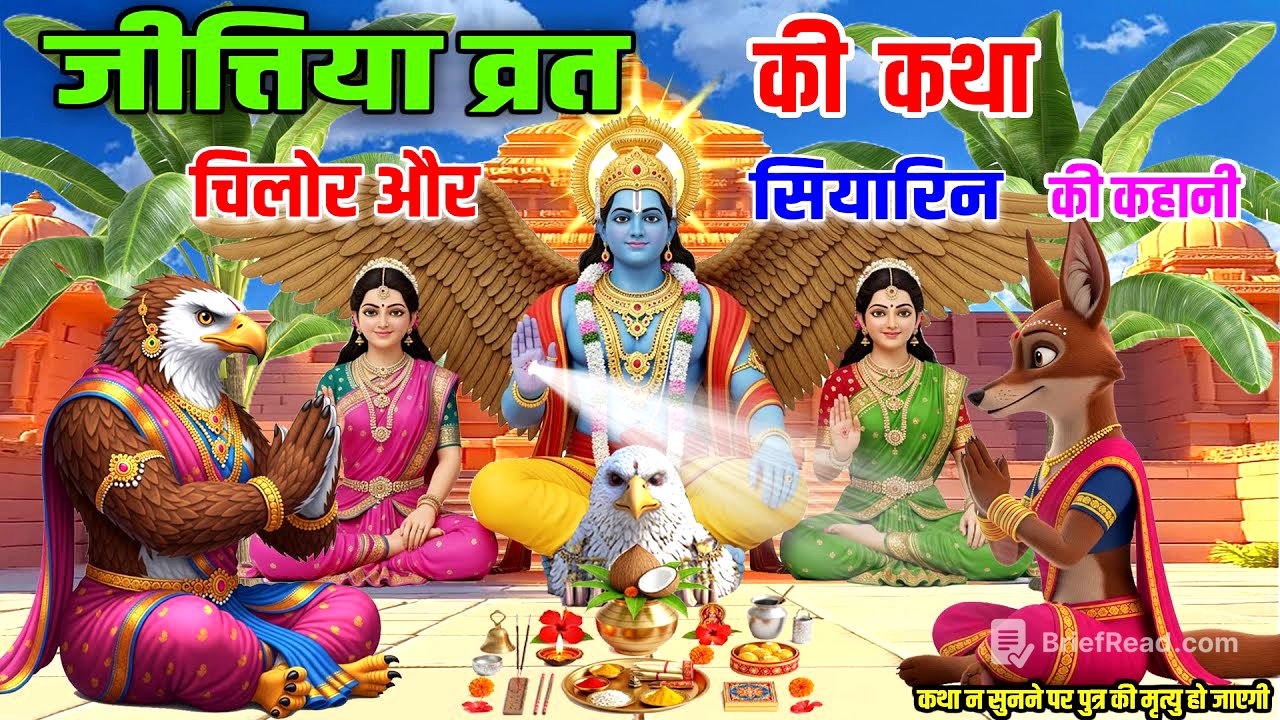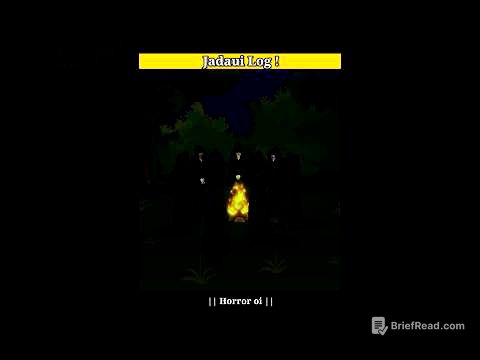TLDR;
This video narrates the story of Jeevit Putrika Vrat (Jitiya), a fast observed by mothers for the well-being and longevity of their sons. The story revolves around a Chilhor bird and a female jackal who observe the fast, but with different levels of dedication, leading to different outcomes in their next lives. The narrative emphasizes the significance of observing the fast with purity and a true heart to protect children from troubles and ensure prosperity for the family.
- The fast is observed on the Krishna Paksha of the month of Ashwin, starting on Saptami and ending on Navami.
- The story highlights the importance of listening to the Jitiya Vrat Katha (story) and the consequences of not observing the fast correctly.
- Ultimately, the moral of the story underscores the power of faith, devotion, and adherence to religious practices for the well-being of one's family.
Introduction to Jeevit Putrika Vrat [0:00]
The video begins with wishes for Jeevit Putrika Vrat and introduces the story of the living daughter, emphasizing its importance for mothers observing the Jivanti Putrika fast. Listening to this story is believed to increase the lifespan of sons and eliminate troubles. The fast, observed on the Krishna Paksha of Ashwin month, starts with bathing and eating on Saptami and ends on Navami. It's considered the most important fast for sons' longevity and trouble eradication, requiring a true heart and purity. A prayer is offered to Mata Jitiya and Jeevit Vaahan God for protection and prosperity.
The Friendship of Chilhor and Siyarin [1:32]
The story unfolds on the bank of the Narmada river, where a Chilhor bird lives in a nest atop an old Pakkad tree, and a female jackal resides in a hole beneath it. They share a close friendship and converse regularly. One morning, the Chilhor bird notices a large crowd near the river and asks the jackal to investigate. The jackal hesitates due to fear of humans, so the Chilhor bird decides to inquire herself.
The Significance of the Jitiya Fast [3:29]
The Chilhor bird discovers that the women are observing a fast for the long life of their sons, known as the Jitwahan fast, observed in the month of Ashwin. An old woman explains the fast's benefits, including long life for sons and even the possibility of barren women conceiving. Inspired, the Chilhor bird resolves to observe the fast, and the jackal decides to join her.
Observing the Fast: Contrasting Approaches [5:03]
The Chilhor bird cautions the jackal about her ability to adhere to the fast due to her larger appetite and potential temptation to eat meat. Both take a dip in the Ganga and start the fast. The Chilhor bird prepares grains for her children, instructing them to eat on their own, while the jackal consumes meat before the fast begins.
The Night of the Fast and Broken Vows [6:14]
As evening approaches, both bathe in the Ganga. The Chilhor bird attends the puja and listens to the story, while the jackal falls asleep. Later, the jackal succumbs to temptation and eats a half-burnt corpse, breaking her fast. The Chilhor bird witnesses this and prays for forgiveness, lamenting the jackal's deceit.
Consequences and Rebirth [10:08]
The next morning, both bathe in the Ganga again. The Chilhor bird completes her fast by drinking milk at a cowshed and sharing prasad with her children, while the jackal eats the remaining meat. Years pass, and they continue to observe the fast with contrasting dedication. Eventually, they decide to give up their lives in the Ganga, with the jackal desiring to be born into a royal family and the Chilhor bird wishing to marry a minister. They are reborn as Sheelavati (the jackal) and Kapuravati (the Chilhor bird) in a businessman's house.
Marriage and Jealousy [12:53]
Sheelavati marries the king, while Kapuravati marries the minister's son. Kapuravati bears seven children who survive, while Sheelavati's children die at birth. Envious, Sheelavati conspires to kill Kapuravati's sons, but they are miraculously revived each time due to Kapuravati's faithful observance of the Jitiya fast.
The King's Dilemma and the Forest [14:34]
Driven by jealousy, Sheelavati demands that the king kill Kapuravati's sons. The king, torn between his promise and the sin of killing children, takes the minister's sons to the forest, kills them, and presents their heads to Sheelavati. Kapuravati, unaware, continues her fast.
The Divine Intervention of Jeet Vaahan [16:38]
In Brahmlok, the Gods notice the injustice against Kapuravati and awaken Jeet Vaahan from his meditation. Jeet Vaahan restores the children's heads to their bodies, sprinkles nectar, and brings them back to life. He delivers them to Kapuravati's house, who is overjoyed to see them.
The Revelation and Forgiveness [18:04]
The next morning, Kapuravati discovers the heads have been replaced with jewels. She sends a letter to Sheelavati, who seeks forgiveness. Kapuravati reveals their past lives and the reason for Sheelavati's misfortune: breaking the fast. She explains the proper method of observing the fast, emphasizing purity and devotion.
Redemption and Conclusion [21:39]
Sheelavati observes the fast correctly the following year, and her next child survives. Both sisters eventually have surviving sons. The story concludes by reiterating the importance of observing the Jitiya fast with a true heart for the long life of one's son, wealth, happiness, and peace. The video ends with paying obeisance to Chilhor Rani and praying for the long life of sons.









